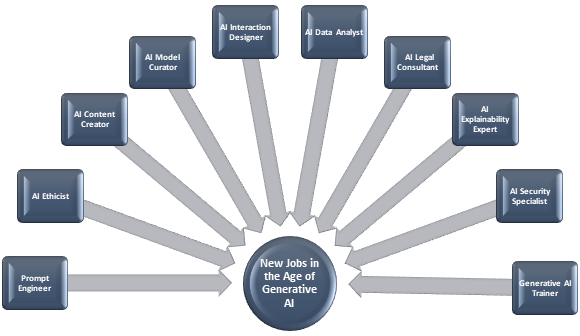Comments
- No comments found

The rapid advancement of AI technologies like large language models and generative adversarial networks is set to reshape the job market.
AI's incredible advancement is expected to create new opportunities across various industries.
As these powerful AI systems become more prevalent, organizations will need skilled professionals to develop, deploy, and manage them responsibly.
In this article, we explore ten of the top jobs that have emerged or will likely emerge as a result of generative AI.

As the name suggests, prompt engineers are responsible for crafting precise and effective prompts to guide generative AI models, ensuring they generate accurate and relevant outputs. This role requires a deep understanding of natural language processing (NLP), machine learning algorithms, and the specific domain in which the AI model will be applied.
Key Skills:
- Expertise in NLP and language modeling
- Knowledge of machine learning techniques and model architectures
- Strong communication and problem-solving abilities
- Domain expertise in the relevant field (e.g., healthcare, finance, marketing)
With the increasing power and ubiquity of AI systems, AI ethicists play a crucial role in ensuring these technologies are developed and deployed responsibly. They address critical issues such as bias, privacy, transparency, and the societal impacts of AI.
Key Skills:
- Expertise in ethics, philosophy, and social sciences
- Understanding of AI technologies and their implications
- Ability to navigate complex ethical dilemmas and provide practical guidance
- Strong communication and decision-making skills
Generative AI models have the capability to produce written content, images, videos, and other multimedia assets. AI content creators leverage these tools to generate engaging and creative content for various platforms and industries, such as marketing, entertainment, and journalism.
Key Skills:
- Proficiency in using generative AI tools and platforms
- Creativity and storytelling abilities
- Understanding of content creation best practices and audience engagement
- Knowledge of relevant industries and content domains
With the proliferation of AI models, organizations need professionals who can evaluate, select, and maintain the appropriate models for specific use cases. AI model curators are responsible for ensuring the models are up-to-date, accurate, and aligned with organizational goals.
Key Skills:
- Expertise in machine learning model evaluation and selection
- Knowledge of various AI model architectures and their strengths/weaknesses
- Understanding of data management and preprocessing techniques
- Strong analytical and decision-making abilities
As AI systems become more conversational and interactive, AI interaction designers are tasked with creating intuitive and engaging user experiences. They ensure seamless human-AI interactions across various platforms and devices, such as voice assistants, chatbots, and augmented reality applications.
Key Skills:
- Proficiency in user experience (UX) and user interface (UI) design
- Understanding of conversational AI and natural language interactions
- Knowledge of human-computer interaction principles
- Ability to conduct user research and testing
Generative AI models require large and diverse datasets for training. AI data analysts are responsible for collecting, cleaning, and preparing data to feed into these models, ensuring data quality and adherence to privacy and ethical standards.
Key Skills:
- Expertise in data mining, data wrangling, and data preprocessing
- Knowledge of data structures, databases, and data storage solutions
- Understanding of data privacy and security best practices
- Strong analytical and problem-solving abilities
The rapid adoption of AI technologies raises legal questions and challenges related to intellectual property, liability, and regulatory compliance. AI legal consultants advise organizations on navigating the complex legal landscape surrounding AI.
Key Skills:
- Expertise in intellectual property law, data privacy regulations, and AI-related legislation
- Understanding of AI technologies and their implications
- Ability to interpret and apply legal frameworks to emerging AI use cases
- Strong communication and advisory skills
As AI systems become more complex, there is a growing need for experts who can interpret and explain the decision-making processes of these models. AI explainability experts help organizations understand and communicate how their AI systems operate, increasing transparency and trust.
Key Skills:
- Expertise in machine learning interpretability and explainability techniques
- Knowledge of AI model architectures and decision-making processes
- Strong communication and visualization abilities
- Understanding of relevant industry domains and use cases
With the increasing reliance on AI systems, ensuring their security and robustness against adversarial attacks and vulnerabilities is crucial. AI security specialists work on developing secure AI systems and mitigating potential risks.
Key Skills:
- Expertise in cybersecurity and AI security best practices
- Knowledge of AI model architectures and potential vulnerabilities
- Understanding of adversarial machine learning techniques
- Strong analytical and problem-solving abilities
Generative AI models require extensive training on large datasets. Generative AI trainers are responsible for designing and implementing efficient training pipelines, optimizing model performance, and ensuring the models are trained on diverse and representative data.
Key Skills:
- Expertise in machine learning model training and optimization
- Knowledge of data preprocessing and augmentation techniques
- Understanding of distributed computing and scalable training infrastructure
- Strong analytical and problem-solving abilities
As generative AI technologies continue to evolve and be adopted across various sectors, new roles and specializations will likely emerge to support the development, deployment, and responsible use of these powerful AI systems. Organizations will need a diverse range of skilled professionals to harness the potential of generative AI while addressing the associated challenges and ethical considerations.
The rise of generative AI presents both challenges and opportunities for the workforce. While some jobs may be automated, many will transform, requiring new skillsets to collaborate effectively with AI and ensure continued success. Here's a breakdown of essential skills for both technical and non-technical employees to navigate the generative AI era:
Technical Skills:
Data Analysis and Interpretation: As data fuels AI models, the ability to collect, analyze, and interpret data will be critical. This includes familiarity with data visualization tools, statistical analysis techniques, and drawing meaningful insights from complex datasets.
Problem-Solving and Critical Thinking: AI excels at specific tasks, but human expertise remains vital in problem-solving and critical thinking. The ability to identify problems that AI can't solve, develop creative solutions, and critically evaluate AI outputs will be highly sought-after.
Understanding of AI Principles: A basic understanding of how AI works, its limitations, and its potential biases will be crucial for effective collaboration. This includes familiarity with concepts like machine learning, natural language processing, and ethical considerations in AI development.
Adaptability and Continuous Learning: The AI landscape is constantly evolving. The ability to adapt to new technologies, embrace continuous learning, and stay updated on the latest advancements will be essential for long-term career success.
Non-Technical Skills:
Communication and Collaboration: Effective communication will be paramount in conveying ideas to AI systems and collaborating with colleagues in AI-powered workflows. This includes clear writing, concise explanations, and the ability to work effectively in teams.
Creativity and Innovation: While AI can automate tasks, human creativity remains irreplaceable. The ability to think outside the box, generate new ideas, and leverage AI to enhance creative processes will be crucial for differentiation.
Critical Thinking and Ethical Reasoning: As AI becomes more integrated into society, the ability to critically evaluate its outputs and identify potential biases is vital. Ethical reasoning and a strong moral compass will ensure responsible use of AI technology.
Project Management and Workflow Optimization: Optimizing workflows for seamless human-AI collaboration will be key. This involves strong project management skills, the ability to delegate tasks effectively, and identifying areas where AI can augment human capabilities.
While this list provides a roadmap, the most critical skill in the generative AI era might be a growth mindset. The ability to embrace change, learn new skills quickly, and adapt to new technologies will be essential for long-term career success. By fostering a spirit of continuous learning and staying curious about the evolving world of AI, both technical and non-technical employees can position themselves to thrive in the years to come.
Ahmed Banafa is an expert in new tech with appearances on ABC, NBC , CBS, FOX TV and radio stations. He served as a professor, academic advisor and coordinator at well-known American universities and colleges. His researches are featured on Forbes, MIT Technology Review, ComputerWorld and Techonomy. He published over 100 articles about the internet of things, blockchain, artificial intelligence, cloud computing and big data. His research papers are used in many patents, numerous thesis and conferences. He is also a guest speaker at international technology conferences. He is the recipient of several awards, including Distinguished Tenured Staff Award, Instructor of the year and Certificate of Honor from the City and County of San Francisco. Ahmed studied cyber security at Harvard University. He is the author of the book: Secure and Smart Internet of Things Using Blockchain and AI.
Leave your comments
Post comment as a guest